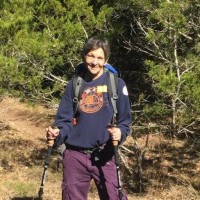|
Deep Brain Stimulation Powers 683-Mile Journey along Israel National Trail  Online PR News – 07-February-2018 – 61-year-old Avis Brodess is preparing to hike the Israel National Trail (Shvil Yisra’el) which winds from the southern to northern borders. The two-month camping trek requires careful planning: supplies to bring, sites to view along the way, and how she will recharge the battery-powered electrodes in her brain that suppress symptoms of dystonia, a painful and disabling neurological disorder. This trip is a healing journey for me, says Brodess. I am taking time to think about everything I have been through. Im just happy to be strong enough to take up this challenge and raise awareness for dystonia. She departs for Israel on February 13 and returns April 18. According to the Dystonia Medical Research Foundation, individuals affected by dystonia struggle against their own bodies to walk, sit, eat, write, and/or speak. The central nervous system is hijacked by chaotic signals that cause uncontrollable movements and abnormal postures in the body and limbs. Brodess is diagnosed with cervical dystonia which affects the neck muscles (along the cervical spine). The symptoms began in her 30s and became completely disabling. My muscles were fighting each otherits painful. I had uncontrollable tremors and jerking in my neck, and was homebound. I was shaking so much I couldnt eat. Brodess had a groundbreaking career in finance, a busy social and family life, and has been an elite competitive tennis player since childhood. After medications failed to control the symptoms, Brodess underwent deep brain stimulation in 2008. The multi-step neurological procedure involved implanting electrodes in her brain and a rechargeable battery-powered stimulator in her chest wall. The stimulator must be charged by a remote control device every few days to keep it functional. If the hardware powers down, the dystonia returns in full force. Deep brain stimulation gave me my life back, says Brodess. Im ecstatic where I am today. This is a significant, painful, alienating disease. Dystonia does not get the publicity it should. Because dystonia is not better known, the symptoms are frequently mistaken for mental illness, intoxication, or poor social skills. Patients often suffer profound social anxiety and/or depression, frequently withdrawing from social situations. Dystonia is more common than Huntingtons disease, muscular dystrophy, and Lou Gehrigs disease (ALS). There are multiple forms of dystonia that impact people of all ages and backgrounds. There is not yet a cure and, though treatments exist, there is no therapy that benefits even a majority of patients. The Dystonia Medical Research Foundation (DMRF) is the leading dystonia patient advocacy organization. The DMRF can be reached at 800-377-3978, [email protected], or www.dystonia-foundation.org. |
| Jessica Feeley |
| http://www.dystonia-foundation.org |
| 9125100337 |






